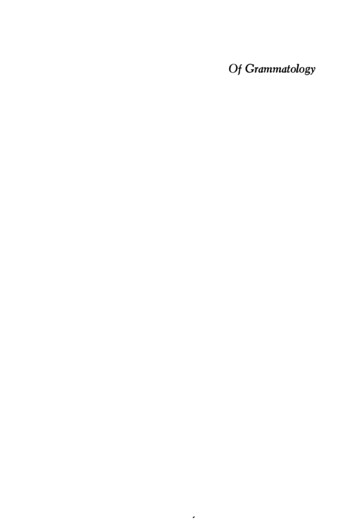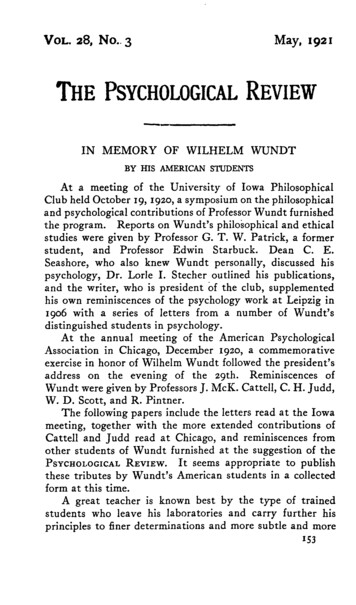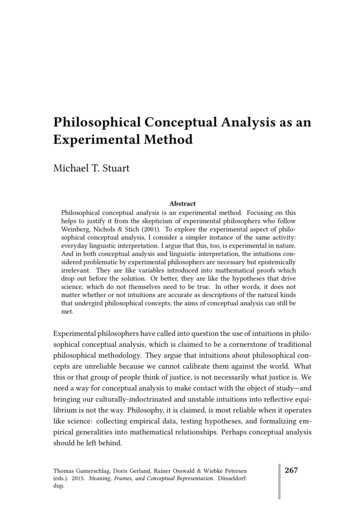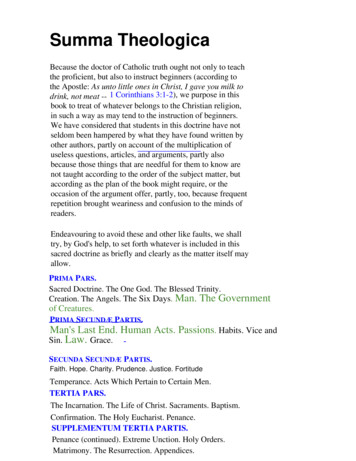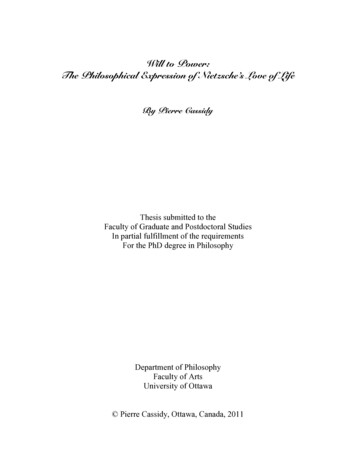
Transcription
Will to Power:The Philosophical Expression of Nietzsche’s Love of LifeBy Pierre CassidyThesis submitted to theFaculty of Graduate and Postdoctoral StudiesIn partial fulfillment of the requirementsFor the PhD degree in PhilosophyDepartment of PhilosophyFaculty of ArtsUniversity of Ottawa Pierre Cassidy, Ottawa, Canada, 2011
dUnpublishedWorks.109Conclusion.1122
e,AlternativeInterpretation.155PartI- r.174PartII- y.2333
AbstractAny adequate interpretation of the concept of the will to power, given the radical breakwith the history of philosophy it presupposes, requires a preceding analysis ofNietzsche’s critique of the history of philosophy as a critique of metaphysics. Only onceNietzsche’s critique of metaphysics is properly understood as a critique of, in thebroadest sense, any correspondence conception of truth, can the philosophical concept ofthe will to power, as a product of that critique, be understood as well. Each of the threetypical types of interpretative approaches to the will to power (i.e. as a metaphysicalconcept, as an empirical concept, as an object of interpretive play) will provide acritically constructive opportunity to narrow an acceptable definition of Nietzsche’spositive conception of philosophy as a distinctive and unorthodox type of history,according to which any interpretation rests, not on truths, but on its author’s prejudices orfundamental values. Moreover, using Gilles Deleuze’s largely ignored or otherwisegrossly misunderstood Nietzsche et la philosophie, a non-normative, post-metaphysicaljustification consistent with that critique can then be provided for Nietzsche’s radicalreform to the philosophical method. According to Nietzsche, philosophy as a will topower is preferable to philosophy as a will to truth because it is consistent with hisprofound and unjustified love of life. In fact, the will to power it is the philosophicalexpression of that love.4
AcknowledgementsFirst and foremost, I would like to thank Dr. Sonia Sikka for her patience, for her supportand guidance, for her unwavering encouragement that I pursue a project that I genuinelycare about, and for helping me turn an inspiration into a work. Thank you.Also, I would like to thank Mme. Jocelyne Lacasse for all of her help understanding andnavigating the institution in the context of which this thesis was produced. It is largelythanks to her that I was able to devote myself to it so entirely. She was always there tohelp, even in ways I did not expect, and by answering questions I could not have knownto ask. Thank you.I would also like to thank Dr. Jeffrey Reid, Dr. Francisco Gonzalez, Dr. Isabelle ThomasFogiel, and Dr. Christine Daigle for their constructive contributions to making this thesisbetter than it otherwise would have been.Finally, I would like to thank my friends and my family for their immense andunconditional support.5
IntroductionIn his Thoughts On Machiavelli, Leo Strauss characterizes Niccolo Machiavelli asa teacher of evil because he makes plain, and thereby readily available to anyone, thedangerous and amoral principles of political power that had been until then the unspokenunderstanding of a few (Strauss 1984, 174). If Strauss’ evaluation is correct, then whatfollows could be condemned for a comparable reason. What follows is an attempt tomake plain and readily available one of Friedrich Nietzsche’s most challenging anddangerous theses, which he obscures, perhaps intentionally, with an often complex andconvoluted presentation. However, while Strauss believes that Machiavelli’s thesis wasdangerous because he explicitly privileged effective governance over moral politics,making plain Nietzsche’s thesis would be making plain his interpretation of philosophy’swill to truth as a contingent historical convention rather than a metaphysical ormethodological necessity.The following analysis, however, is not conditioned by the same horrific socialand political climate that conditioned Strauss’ thesis and method. Insofar as it isevaluative, it is evaluative only in a purely academic sense. It seeks to uncover the mostconsistent and comprehensive account of the concept of the will to power by criticallyevaluating the relative merits of the available types of interpretative approaches.Most of the philosophical implications of the will to power will be set asidebecause the concept radically transgresses so many of philosophical conventions thatquietly, though pervasively structure the evaluative process. It is this transgression of thefundamental, and typically unconscious principles of philosophical evaluation that fuelsthe bulk of the distorting interpretations that condemn it, or that subject it to subsequent6
condemnation. Only once the radical quality of Nietzsche’s concept and its context areproperly discerned, is the far more modest endeavor of understanding the concept evenpossible. Therefore, while the odd, disconcerting, and potentially dangerous quality ofNietzsche’s philosophical concept should be kept in mind, it ought to be kept in mindonly in order that it may be the more successfully set aside until it can be faced boldly,honestly, and with due diligence.However, while the criticisms directed against the will to power are oftenmisguided, in that they are criticisms of something that the will to power is not, they dononetheless reveal the main obstacles to understanding it. Once the two most prevalentand serious criticisms directed against it are shown to rest on a fundamentalmisunderstanding of the context in which the concept is developed, the principle obstacleto understanding the concept will become evident and easily overcome. These twocriticisms are Nietzsche’s supposed inconsistency, and what is sometimes called theproblem of self-reference. The first of these is a product of Nietzsche’s early andsustained critique of truth, and its relation to his positive philosophical claims. Thesecond refers to the supposed absurdity of his critique of truth as a rejection of truth,which is taken to be a truth-claim whose hypothetical truth is logically impossible. IfNietzsche’s thought is reduced to a set of simplistic logical relations, then these problemsseem insurmountable. However, these two objections are sustainable only so long as theimpressive self-awareness and subtlety of Nietzsche’s philosophy are either oversimplified, or ignored.Nietzsche’s critics often cite his concept of the will to power as a prime exampleof these two supposed failings. The will to power is troublesome because it is a7
philosophical concept presented both subsequent to and concurrent with his critique oftruth, and it seems to function as the subject of either metaphysically or empirically trueclaims about the world. However, the serious and careful reader will also discover in thewill to power an opportunity to defend Nietzsche against this apparent inconsistency.The problematic status of the will to power is exemplified in the followingposthumously published entry in Nietzsche’s notebook dated 1885:And do you want to know what ‘the world’ is to me? Shall I show it to you inmy mirror? This world: a monster of energy, without beginning, without end; afirm, iron magnitude of force that does not grow bigger or smaller, that does notexpend itself but only transforms itself; as a whole, of unalterable sized, ahousehold without expenses or losses, but likewise without increase or income;enclosed by “nothingness” as by a boundary; not some blurry or wasted, notsomething endlessly extended, but set in a definite space as a definite force, andnot a space that might be “empty” here or there, but rather as force throughout,as a play of forces and waves of forces, at the same time one and many,increasing here and at the same time decreasing there; a sea of forces flowingand rushing together, eternally changing, eternally flooding back, withtremendous years of recurrence, with an ebb and flood of its forms; out of thesimplest forms striving toward the most complex, out of the stillest, most rigid,coldest forms towards the hottest, most turbulent, most self-contradictory, andthen again returning home to the simple out of this abundance, out of the play ofcontradictions back to the joy of concord, still affirming itself in this uniformityof its courses and its years, blessing itself as that which must return eternally, asa becoming that knows no satiety, no disgust, no weariness; this, my Dionysianworld of the eternally self-creating, the eternally self-destroying, this mysteryworld of the twofold voluptuous delight, my “beyond good and evil”, withoutgoal, unless the joy of the circle is itself a goal; without will, unless a ring feelsgood will toward itself- do you want a name for this world? A solution for allits riddles? A light for you, too, you best-concealed, strongest, most intrepid,most midnightly men?- This world is the will to power and nothing besides!And you yourself are also this will to power- and nothing besides! (Nietzsche,The Will to Power 1968, 1067 ; Werke VII3, Nachgelassene Fragmente, 38[12])This passage seems relatively straightforward. Nietzsche is describing the worldas “will to power and nothing besides” (Ibid.). However, if this is the case, and thenumerous passages like these, which are peppered throughout his oeuvre, though mostprominently in the posthumously collected, edited, and published notebooks, are acceptedas authentic features of Nietzsche’s philosophy, then their relation to his critique of truthmust be clarified. Moreover, because Nietzsche’s description of the world as will to8
power and nothing besides is explicitly perspectival, it seems that even if it can berendered consistent with his critique of truth, it remains nonetheless little more than anidiosyncratic confession with no philosophical value. Consequently, if the will to poweris to be a philosophically compelling concept, then it must, in the first place, be renderedconsistent with Nietzsche’s early and sustained critique of truth, and in the second, bedemonstrably valuable despite its perspectival quality.At first sight, it seems as though any interpretation of the will to power, givenNietzsche’s critique of truth, must exemplify one of three equally unsatisfyingapproaches. First, the will to power can be interpreted as inconsistent, either with theother features of Nietzsche’s oeuvre, or with itself; second, the passages that producethese philosophical problems may be rejected in order to save the overall coherence ofNietzsche’s philosophy; or finally, the cosmological tenor of the passages may beinterpreted as irrelevant given their idiosyncratically perspectival status. Therefore, theproblem of coherence can either guide a given interpretation, be trumped by the principleof comprehensiveness, or be rejected altogether as constituting a genuine problem. Noneof these, however, actually resolve the problem. They simply accept some version of theproblem. Each one chooses a set of problematic consequences that it finds the leasttroublesome.Almost the entire history of interpretation of the concept of the will to power canbe classified as instances of one of these three approaches. Respectively, the will topower is interpreted either as a metaphysical concept, as an empirical concept, or as anobject of interpretive play. While each one, on its own, fails to provide an adequateinterpretation of the will to power, a critical assessment of each approach can help delimit9
the scope of an acceptable alternative. Moreover, once the sense attributable to the willto power is adequately narrowed, a largely ignored, and otherwise grossly misunderstoodfourth approach can provide a final, necessary contribution to a compelling interpretation.This peripheral fourth approach discovers a philosophical justification for Nietzsche’scritique of truth, which has historically functioned as the structuring principle ofphilosophical discourse, and at the same time, it discovers in Nietzsche a justification forhis re-attribution of that structuring function to his concept of the will to power.If the following analysis is successful, then the will to power should provide anexample of how some of the most seemingly incommensurable features of Nietzsche’sphilosophy as a whole could be rendered consistent parts of a coherent whole. As aresult, Nietzsche’s philosophy would become a far more stable and intelligible object ofevaluation. Questions regarding its philosophical value, its ethical implications andacceptability, and its function as a determining feature of the subsequent course ofphilosophy specifically, and the humanities in general could finally be undertaken on asure footing and in good faith. At this juncture, however, any discussion of thesepossibilities would mean jumping too far ahead, far too quickly. Instead, this analysiswill set upon its carefully delineated task of answering the question: ‘What is the sense ofNietzsche’s concept of the will to power?’As a final introductory consideration, however, given the history of Nietzschescholarship, this analysis’ choice of primary and secondary source material should bejustified. In the first place, the sense of the phrase “Nietzsche’s oeuvre” should bedefined given its problematic posthumous history. Though this consideration will berevisited in greater detail in the following chapters, it should be noted that this analysis10
takes the moderate methodological position that any relevant available material can andshould be used as evidence for, or as counter-evidence to any claim about Nietzsche’sphilosophy. Although Nietzsche’s published material will be given precedence,Nietzsche’s notebooks, letters, and biography will also stand as possible qualifying orcomplementary sources. As was stated above, the criteria of evaluation that will guidethis analysis are coherence and comprehensiveness. Consequently, if one of twocompeting interpretations is to be preferred, then that interpretation will be the one thatcan be rendered consistent with the greatest bulk of Nietzsche’s oeuvre. However,Nietzsche’s oeuvre does not include the book titled The Will to Power as anything otherthat an extremely problematic collection and organization of Nietzsche’s notebooks1.Therefore, though Walter Kaufmann’s translation of The Will to Power is cited, it is citedonly as an English language source for some useful passages in the notebooks. In orderto avoid any misinterpretation of this analysis either as contingent on a mistranslation, oras the product of a philologically problematic posthumous selection and organization ofNietzsche’s notebooks, all citations will also be sourced in the German critical edition ofNietzsche’s Werke, edited by Georgio Colli and Mazzino Montinari.In the second place, some justification should be provided for this analysis’choice of secondary sources. The secondary sources that are used as examples of thethree principal interpretative approaches to the concept of the will to power are chosenfor a variety of different reasons. They stand either as very prominent interpretations in1For a sustained analysis of the history of the book titled The Will to Power and of itsplace and function in the history of Nietzsche scholarship, see Wolfgang Müller-Lauter’sessay „Der Wille zur Macht“ als Buch der ‚Krisis’ (Müller-Lauter, "Der Wille zurMacht" als Buch der Krisis Philosophischer Nietzsche-Interpretation 1995), and MazzinoMontinari’s La volonté de puissance n’existe pas (Montinari 1996).11
the history of Nietzsche scholarship, as very rich and compelling sources for a possiblealternative interpretation to the one that will be forwarded in the present analysis, or asparticularly useful sources for a negative qualification or partially positive qualificationof Nietzsche’s concept and of its context. However, some very prominent figures areabsent. Karl Löwith, for example, does not make an explicit appearance. However, as isevidenced by his reference to G.A. Morgan’s interpretation of the concept will to poweras an explanatory principle meant to describe the basic character of “life” (Löwith 1981,405), his interpretation is indirectly assessed because it is, in this respect, the same asWalter Kaufmann’s. Consequently, because Kaufmann’s interpretation is critiqued onthe grounds that it interprets the will to power as an explanatory concept meant todescribe “life” as a whole, Löwith’s interpretation is implicitly critiqued in the samemanner and for the same reasons. Therefore, though this approach does not aim at acomprehensive and explicit enumeration or treatment of all available secondary sources,it aims at a comprehensive evaluation of the strengths and weaknesses of the availablesecondary sources to the extent that the bulk of available secondary literature can beclassified as belonging to one of the three principal types of interpretive approaches to theconcept of the will to power.Moreover, this method of evaluating the history of interpretation of the concept ofthe will to power occasions a smaller number of far more careful and sustained analyses.Rather than citing a large number of interpretations, this analysis presents the smallernumber of interpretations it does assess directly in their own terms. Therefore, it canreasonably claim to engage each interpretation and interpretive approach that it doesassess in a spirit of charity. Instead of reducing those interpretations to their conclusions,12
which are then either accepted or discarded without reference to the premises from whichthey were inferred, it patiently makes explicit the premises from which those conclusionswere inferred. As a result, the analysis is then able both to assess the value of thoseconclusions in their own terms, and then only subsequently in relation to the object of thepresent analysis and evaluative criteria according to which it is framed. This method hasthe advantage of making as transparent as possible the values that underscore myanalysis’ criteria of philosophical evaluation, and it provides the reader with a means ofconsciously positioning himself in relation to those values, given his own.Having made explicit the object of the following analysis, its method, and thecriteria of evaluation that will guide its interpretations of alternative accounts, it is nowpossible to take the first sure step towards an adequate interpretation of the sense of theconcept of the will to power.13
Chapter1:TheWilltoPowerasaMetaphysicalConceptThis chapter will evaluate and reject the first of the three conventional interpretiveapproaches to Nietzsche’s concept of the will to power: the will to power as ametaphysical concept. In doing so, however, it will achieve two ends. First, it willprovide an account of what kind of philosophy Nietzsche is not doing: metaphysics.Second, it will allude to the kind of philosophy Nietzsche is doing: philosophy as history.In order to justify this rejection, and achieve these two ends, this chapter willsubject two examples of this approach to a careful analysis and evaluation. These twoexamples, however, are not intended to be an exhaustive enumeration of the availableexamples of this type of interpretative approach. Instead, they are presented asrepresentative of the strengths and weaknesses common to this approach as a whole.Therefore, though the interpretations of the concept of the will to power offered byMartin Heidegger and Jürgen Habermas are very distinct, this analysis will not attenuatethat difference. Instead, it will show by their very difference to what extent anyinterpretation of the will to power as a metaphysical concept is subject to a commoncriticism.Despite their differences, these two interpretations of the will to power as ametaphysical concept are two consequences of the same problematic misunderstanding.Both interpretations mistakenly attribute to Nietzsche a philosophical method of enquirythat he explicitly, and repeatedly, rejects. They both construe Nietzsche as ametaphysician. Nietzsche’s oeuvre and his biography provide an enormous amount ofcounter-evidence to this interpretation.14
Heidegger’s interpretation of the will to power as one of the five major rubrics ofNietzsche’s thought, which opens a way towards understanding his thought as ametaphysics of the will to power, and Habermas’ interpretation of it as a philosophicalattempt to engage, not only with resigned unconcern, but enthusiasm, the dissolution ofthe unity of modern time consciousness, both fail. Both fail because neitheracknowledges Nietzsche’s evaluation of the history of philosophy as involving a clearrejection of metaphysics. Furthermore, neither acknowledges the extent to which hispositive philosophical analyses are the products of his philological educationalbackground. In the first place, Heidegger’s interpretation will be set against Nietzsche’sarguments for rejecting metaphysics as a valuable type of e
the will to power, as a product of that critique, be understood as well. Each of the three typical types of interpretative approaches to the will to power (i.e. as a metaphysical concept, as an empirical concept, as an object of interpretive play) will provide a critically constructive opportunity to narrow an acceptable definition of Nietzsche's



